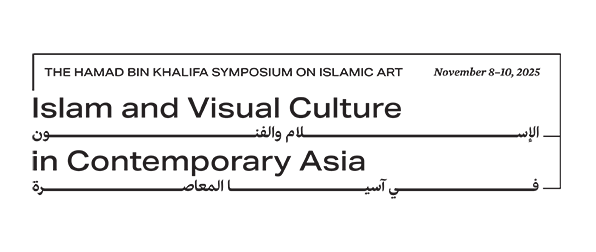Symposium Advisers

Monica Merlin is Assistant Professor of Art History at Virginia Commonwealth University School of the Arts in Qatar (VCUarts Qatar). With a specialization in Chinese studies and Asian art, she holds a doctorate in art history from Oxford University. Her research investigates the work and practice of contemporary women artists in China and Global Asia with a focus on gender, feminism, intersectionality, visual activism and mobility. Merlin’s publications are included in peer-reviewed journals and edited volumes, and she has contributed to encyclopedic and curatorial projects. She is the co-PI of the Global Asia: Mobilities and Arts Lab (GA:MA Lab), a research initiative funded since 2024 by the Institute for Creative Research (ICR) at VCUarts Qatar.
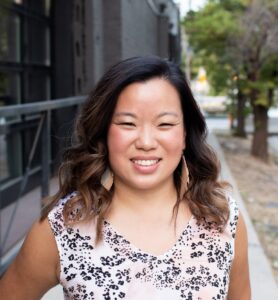
Michelle Yee is Assistant Professor of Art History whose research focuses on contemporary Asian American and Asian Diasporic art. Her research interests include race and representation, transnational connections and collisions, and cosmopolitanisms. Her writing can be found in journals such as Asian Diasporic Visual Cultures and the Americas, Third Text, Panorama, and Art Etc. as well as several exhibition catalogues. She received an MA and PhD in Visual Studies from the University of California, Santa Cruz, an MA in Art History from the University of Connecticut, and a BA in Art History and English Literature from Georgetown University.
Saturday, November 8
Keynote Address and Exhibition
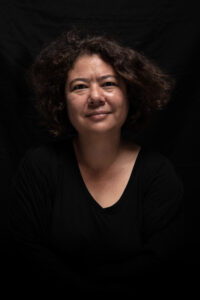
Photographer: Wee Seng
Yee I-Lann (b. 1971, Kota Kinabalu, Sabah, Malaysian Borneo) is an interdisciplinary artist working across photomedia, textiles, installation, filmmaking, and community collaboration. Her work explores the entanglements of colonial histories, local cosmologies, and structures of power across the Southeast Asian region and its global connectivities. In recent years, she has collaborated with hinterland Dusun and coastal Bajau Sama Dilaut weavers in Sabah, developing a mat-based practice in which the tikar operates as medium, method, and philosophy—often centering counter-narratives and histories from below. These works explore decolonial imagination, collective making, cultural resilience, and the everyday as a site of critical engagement. Her art has been widely exhibited in museums and biennales across Asia, Europe, Australia, and North America, and is held in major international collections. Based in Kota Kinabalu, Yee has served on the boards of FINAS and Forever Sabah, and is co-founding partner of Kota-K Art Gallery. She describes herself as an “&”.
Sunday, November 9
Curating from Doha: Islamic Art for Contemporary Asia
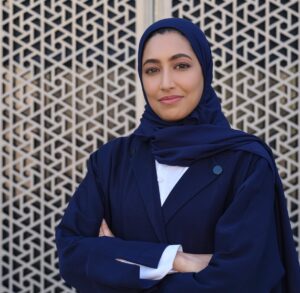
Shaika Al-Nassr is the Director of the Museum of Islamic Art (MIA) in Doha, with 17 years of dedicated service across various roles. Formerly Deputy Director of Curatorial Affairs, she led the museum’s major relaunch in 2022. As Head of Exhibitions since 2007, she oversaw numerous exhibitions and contributed to key MIA publications, including Unseen Treasures (2010) and Reading Quranic Manuscripts (2011). Al-Nassr holds a BA in English Literature from Qatar University, a postgraduate degree in Islamic Art from SOAS (2008), and a Master’s in Museum Studies from UCL (2011). She has presented over 15 papers internationally and participated in leadership programs, including the Getty Leadership Institute and Qatar Leadership Centre. Her experience also includes internships at Tate Britain and the National Portrait Gallery. Passionate about Islamic art and museology, Al-Nassr brings a global perspective and deep institutional knowledge to her leadership at MIA.
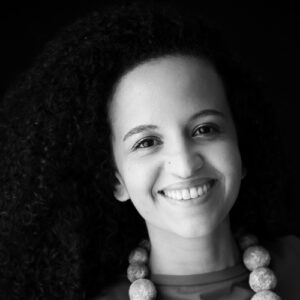
Mounia Chekhab-Abudaya is Deputy Director of Curatorial Affairs at the Museum of Islamic Art (MIA) in Doha, Qatar. She holds a PhD in Islamic Art History and Archaeology from the Pantheon Sorbonne University and specializes in the Western Mediterranean, manuscripts, and pilgrimage-related devotional materials. A former postdoctoral research associate at Harvard’s Aga Khan Program and current fellow of the Center for Curatorial Leadership, she has also taught Islamic Art at institutions including the Sorbonne, INALCO, EHESS, HBKU, and Georgetown University-Qatar. Fluent in multiple languages, Dr. Chekhab-Abudaya studied Arabic, Persian, and Turkish at INALCO and the École Normale Supérieure. She contributed to the Louvre’s Islamic Art galleries and has curated major exhibitions at MIA, including Hajj – The Journey through Art (2013), Qajar Women (2015), Imperial Threads (2017), and A Falcon’s Eye (2020). She co-led the 2022 reinstallation of MIA’s permanent galleries and curated Splendours of the Atlas: A Voyage through Morocco’s Heritage in 2024.
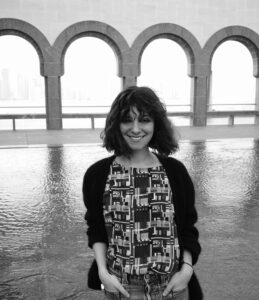
Nicoletta Fazio is Curator of Iran and Central Asia at the Museum of Islamic Art, Doha. An art historian and medievalist by training, she received her PhD in Global Art History from the University of Heidelberg (Germany). Prior to joining the curatorial team in Doha, she was Junior Curator at the Museum für Islamische Kunst, Berlin. At MIA she has worked on several exhibition displays, most recently Baghdad, Eye’s Delight and Fashioning an Empire: Textiles from Safavid Iran. Her next exhibition project, a collaboration with the Aga Khan Trust for Culture (AKTC), focuses on Afghanistan and will open at MIA in February 2026.
Panel 1 – Unsettled Pasts, Urban Futures
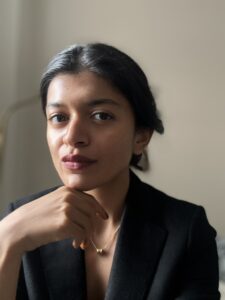
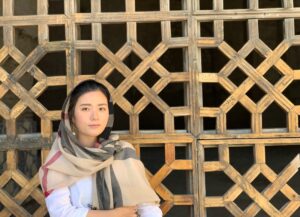
Sylvia Wu is an Assistant Professor in the Department of Art and Art History at the University of Texas at Austin. A historian of medieval and early modern Islamic art, she specializes in the architecture and material culture of the Indian Ocean world, with a focus on Muslim communities in coastal China and their multifaceted engagement with the region’s other Muslim societies. Her primary research interests include mosque and shrine architecture; pilgrimage and the idea of sacred geography; and the intersections of narrative building with material and spatial presentation. Wu’s research has appeared or is forthcoming the International Journal of Islamic Architecture, postmedieval, Journal of Chinese Religions, and Speculum.
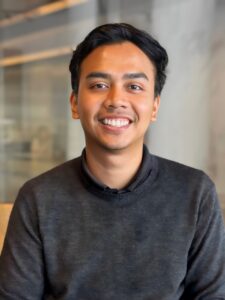
Hadi Osni is an Assistant Curator at the Malay Heritage Centre under Singapore’s National Heritage Board, focusing on curatorial and research work related to Malay heritage in Singapore. He earned his PhD in Architecture from the National University of Singapore in 2023, with a thesis centered on digitally reconstructing lost architecture through the memories of former residents. His research interests encompass material culture, diasporic narratives, and the built environment histories of Southeast Asia. Hadi has led participatory research, cultural mapping, and GIS-based projects aimed at preserving community narratives. He has also contributed to heritage projects supported by government agencies.
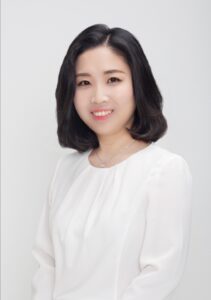
Soojeong Yi earned her PhD in Middle Eastern and African Studies from Hankuk University of Foreign Studies. Her research primarily focuses on migrant Muslims in Korea and Europe since the 20th century. In particular, she aims to reinterpret the history of migrant Muslims in Korea and analyze their adaptation and coexistence in contemporary Korean society. One of her representative studies is Reinterpretation of Migrant Muslims’ History in Korea during the Japanese Colonial Period: Records and Legacies of Turk-Tatar Muslims. Her primary research focuses on: 1) The history of migrant Muslims in Korea since the 20th century, and 2) The adaptation and coexistence strategies of minority migrant Muslims living in contemporary non-Islamic societies. Moving forward, she will continue to focus on research related to migrant Muslims in Korea, as well as comparative studies of migrant Muslim communities in Korea and Europe.
Panel 2 – Acts of Faith, Sounds of Resilience
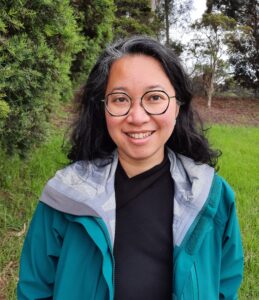
Wulan Dirgantoro is an art historian and curator based in Naarm/Melbourne with research interests in modern and contemporary art in Southeast Asia, focusing on Indonesia and Timor-Leste. As a researcher, she is the author of Feminisms and Contemporary Art in Indonesian Visual Arts (Amsterdam University Press, 2017) and of numerous book chapters, journal articles and catalogue essays on topics relating to contemporary art, gender, memory and activism in post-conflict societies. She currently holds the position of Lecturer in Contemporary Art at the School of Culture and Communication at the University of Melbourne, Australia.
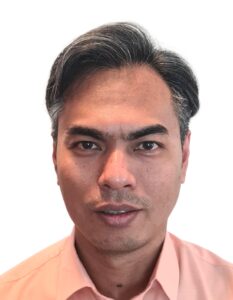
Muhammad Arafat is an Assistant Professor of Sociology and Anthropology at Universiti Brunei Darussalam. His research explores the intersections of culture, place, and identity, focusing on the Malay Muslim communities of southern Thailand and their trans-regional connections. He has published on topics such as transculturality and the Hajj, conflict, memory, and trauma in southern Thailand, and homing practices of diasporic communities. His teaching experience includes courses on various themes pertaining to Southeast Asia, anthropology, and the anthropology of art. He has conducted extensive field research, primarily in southern Thailand and Brunei, but also Makkah, Saudi Arabia.
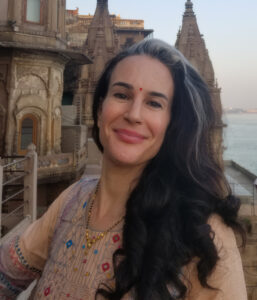
Melia Belli Bose is Associate Professor of South Asian Art History at the University of Victoria, Canada. Her research engages with visual cultures of early modern and contemporary South Asia (north India, Pakistan, and Bangladesh). Her publications include Royal Umbrellas of Stone: Memory, Politics, and Public Identity in Rajput Funerary Art (2015); the edited volumes Women, Gender, and Art in Asia ca. 1500-1900 (2016); Intersections: Visual Cultures of Islamic Cosmopolitanism (2021); Threads of Globalization: Fashion, Textiles, and Gender in Asia in the Long Twentieth Century (2024); guest edited journal editions; and numerous articles and book chapters. Belli Bose’s current book project, Creative Interventions: Art and Cultural Activism in Bangladesh examines artworks that critique, help heal and create community in a changing Bangladesh. She is also conducting research on contemporary Dalit art in India, exploring how Millennial Dalit artists engage Buddhism, politics, and communal identity, and forge alliances with marginalized communities throughout the world.

Photographer: Bert Vervaat
Leonie Schmidt is an Associate Professor at the Media Studies Department at the University of Amsterdam and a researcher at the Amsterdam School for Cultural Analysis. Her research interests include Islamic media (film, television, social media) in Southeast Asia, popular culture, music, ecomedia, and climate change narratives. Leonie is the author of Islamic Modernities in Southeast Asia: Exploring Indonesian Popular and Visual Culture (Rowman & Littlefield, 2017) and It’s My Party: Tat Ming Pair and the Postcolonial Politics of Hong Kong (Palgrave, 2024), and she is the co-editor of Provocative Images in Contemporary Islam (Leiden University Press, 2023). In 2024, she was awarded an ERC Consolidator Grant to explore Islamic popular-cultural approaches to climate change in Southeast Asia.
Monday, November 10
Panel 3 – Gestures of Memory, Reimagined Terrains
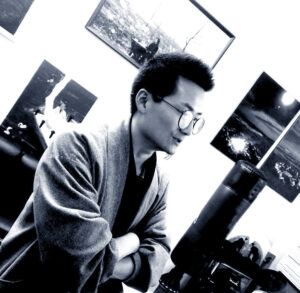
Zeng Qunkai (b. 1987, Hubei) is an artist, critic, and curator based in Xinjiang. He graduated from Xinjiang Arts Institute in 2010. He has curated major regional exhibitions including “Loose Enlightenment” (1985 Xinjiang new art retrospective), “B-Site Narratives” (2010 contemporary emerging art), and “Parallel Nomadism” (video art), and co-organized nearly sixty national and international exhibitions including “Pink Publicity” (Chinese women’s art) and “Daily Pastures” (New Silk Road international video art). His research has received international recognition: “Parallel Geography and Parallel Experiments” was selected for the 34th World Congress of Art History, “Sensation, Modernity and Oasis: Xinjiang Art Exhibitions 1987-2002” received the Robert H.N. Ho Family Foundation Chinese Art History Award, and his work on Xinjiang’s cultural ecology won the 2012 Central Academy of Fine Arts Young Art Criticism Award. He has published dozens of research papers and lectured at major institutions including Peking University and China Academy of Art. His artwork has been exhibited internationally in Beijing, Shanghai, Venice, Milan, Prague, Vienna, and Hong Kong, with works collected by the Macao Museum of Art and Asia Art Archive. He has been featured in major publications including The Art Newspaper, Artforum, and Guangming Daily. Zeng previously served as deputy director of Xinjiang Contemporary Art Museum and holds various leadership positions in professional art organizations.
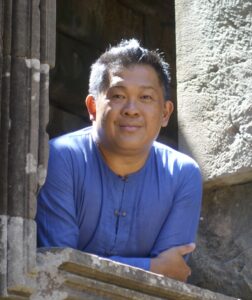
Born in the cosmopolitan village of Phnom Penh, Cambodia, Boreth Ly is an associate professor of Southeast Asian art history and visual culture at the University of California, Santa Cruz. He coedited with Nora A. Taylor, Modern and Contemporary Art of Southeast Asia (2012). In addition, he has written numerous articles and essays on the arts and films of Southeast Asia and its diaspora. Academically trained as an art historian, Ly employs multidisciplinary methods and theories in his writings and analysis, depending on the subject matter. One of his research areas focuses on the intersection between memory and historical trauma. He authored, Traces of Trauma: Cambodian Visual Culture and National Identity in the Aftermath of Genocide (University of Hawai’i Press, 2022).
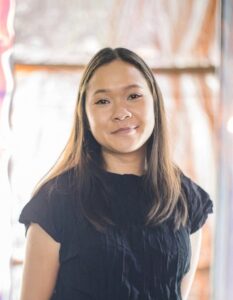
Syaheedah Iskandar is currently affiliated with the Singapore Art Museum and has curated projects across both institutional and independent platforms. She works with vernacular ways of seeing, thinking, and being. Drawing from Southeast Asia’s visual culture(s), her research explores entanglements between the unseen, the hypervisual, and their translations across material and new media practices. Syaheedah was the inaugural Emerging Writers’ Fellow for Southeast of Now: Directions in Contemporary and Modern Art in Asia and received the IMPART Awards 2020 (Singapore) for her curatorial work. She holds an MA in History of Art and Archaeology from SOAS, University of London. With Anissa Rahadiningtyas, she co-developed the course “Islam and Modern and Contemporary Art in Southeast Asia” for the Art History Minor at NUS.

Anissa Rahadiningtyas is a curator of Islamic Aesthetics in Modern and Contemporary Southeast Asia at the National Gallery Singapore. She is the co-convenor for the Art History Minor program at the National University Singapore and co-developed a course on Islam and modern and contemporary Southeast Asia with Syaheedah Iskandar. She received her PhD in art history from Cornell University with a dissertation on the making of modernity in Islam and art in post-colonial Indonesia. Her research interests include comparative modernisms, Indian Ocean studies, postcolonial and decolonial studies, gender and feminism, environmentalism, and Islamic studies.
Panel 4 – Tracing Presence, Blurring Boundaries
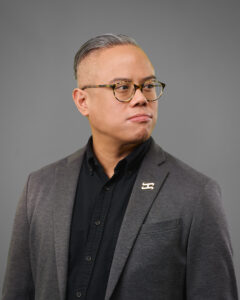
Roberto Jamora is a Richmond-based artist and educator. He holds an MFA from the State University of New York at Purchase and a BFA from Virginia Commonwealth University. He is an Assistant Professor at the VCUarts Art Foundation Program and the Asian Centennial Distinguished Fine Arts Fellow at William & Mary. Roberto is working on a series of paintings titled An Inventory of Traces which explore color and memory. He has been an Artist-in-Residence at Cow House Studios, Jentel, VCCA-France, Hambidge Center, Virginia Center for the Creative Arts, Joan Mitchell Center, Ragdale, and Sambalikhaan. He has exhibited at spaces including Bond Millen Gallery, Virginia MOCA, Frost Art Museum, CAC New Orleans, SFA Projects, Antenna, FLXST Contemporary, Philippine Consulate NYC, ADA Gallery, Topaz Arts, and Shockoe Artspace. His artwork is in collections including the Atlanta Hawks NBA Team, Capital One, CoStar, Harvard Kennedy School, Muscarelle Museum of Art, and several private collections.
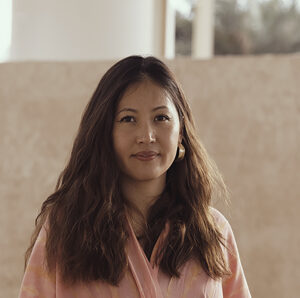
Charwei Tsai (b. 1980, Taipei) is a multidisciplinary artist based in Paris and Taipei. Highly personal yet universal concerns spur Tsai’s multimedia practice, which explores the complexities of cultural beliefs, spirituality, and transience. Geographical, social, and spiritual motifs shape her work, encouraging viewer participation beyond passive contemplation. She completed her studies at the Rhode Island School of Design (BFA, 2002) and École des Beaux-Arts, Paris (2010). Her work has been exhibited at the Islamic Arts Biennale (2025), Palais des Beaux-Arts de Paris (2024), Gwangju Biennale (2023), and Mori Art Museum (2022). Tsai’s works are in major collections, including Tate Modern, Guggenheim Abu Dhabi, and M+. She also publishes Lovely Daze, a curatorial journal held in the libraries of MoMA and Pompidou. Her work has been featured in Artforum, Frieze, and The Guardian.
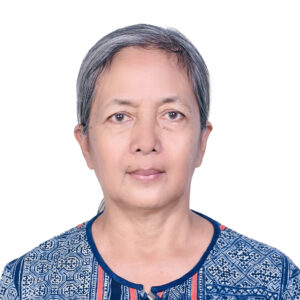
Arahmaiani (b. 1961, Indonesia) is an artist, activist (social-political, cultural, and environmental), and writer. She has long been internationally recognized for her provocative commentaries on social, political, and cultural issues. Emerging in the 1980s, she established herself as a pioneer of performance art in Southeast Asia. As a Javanese Muslim, her work often challenges global stereotypes of Islam, highlighting the diversity within Islamic cultures. In 2006, her practice evolved to focus on community-based performance and art projects, particularly addressing environmental issues. That same year, she began collaborating with an Islamic boarding school community in Yogyakarta. Since 2010, she has been working in the Tibetan Plateau on environmental initiatives. She taught at the Art Academy in Guangzhou, China, from 2006 to 2008. Since 2012, she has been a lecturer in the Department of Southeast Asian Studies at the Faculty of Arts and Humanities, Passau University in Germany.
HBK Fellows
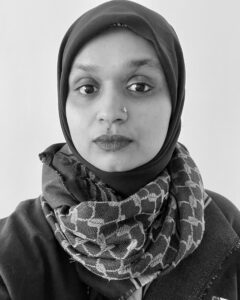
Mehwish Abid is a PhD student in Architecture at McGill University. Her doctoral project, Home as Archive, examines post-partition housing (1947–1977). She has taught at leading Pakistani universities, published with Springer and Routledge, exhibited internationally, and was Visiting Artist Fellow at Harvard’s Lakshmi Mittal Institute (2022). Her research and curatorial practice explore the Muslim home as an archive.
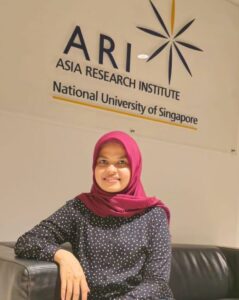
Myra Abubakar is an academic fellow at the Asia Research Institute, National University of Singapore. Her research explores gender, memory, and Islamic visual cultures in Southeast Asia. She holds a PhD from the Australian National University, where her thesis examined the national commemoration of female heroism in postcolonial Indonesia.

Katia Chaterji is Assistant Professor of Asian and Asian American Studies at Loyola Marymount University in California, USA. Her work engages oral history and ethnography to explore the shared histories between Islam and the performing arts in Sumatra, Indonesia. She holds a PhD in history from the University of Washington.
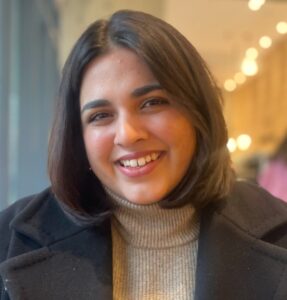
Sanniah Jabeen is a PhD candidate in Art History at the University of Toronto. Her research examines how digital printing, machine replication, and mass production impact modern and contemporary South Asian arts. Sanniah has completed curatorial fellowships at the Royal Ontario Museum, Islamic Art, and Material Culture Collaborative (IAMCC), UNESCO, The Art Museum at the University of Toronto, and the Lahore Biennale Foundation.
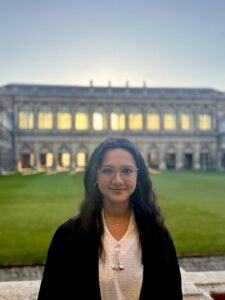
Imaan Markar is a final-year History PhD student at the University of Cambridge. She completed her BA (hons) in History of Art at University College London and MSt in History of Art and Visual Culture at the University of Oxford. She is interested in gender and visual culture in the Global South, with a focus on South Asia, and hopes to pursue a career in curating and research after finishing her doctoral studies.
